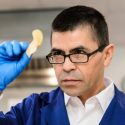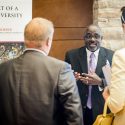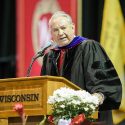Faculty Fellows initiative offers a new route to retention
Many deans and program leaders at the University of Wisconsin–Madison may feel like their array of bright young faculty members serves as a recruiting pool for other institutions.
Much talk has revolved around how to stem the tide of young stars who earn tenure, only to be lured away by more lucrative offers elsewhere. A new idea that was initiated in the College of Letters and Science and is being implemented by other units on campus offers a model of action to keep that teaching and research talent at UW–Madison.
The Faculty Fellows model uses private support to create five-year supplemental financial packages for deserving faculty members. The first named Faculty Fellows fund in the College of Letters and Science was set up by alumnus George Hamel Jr. and his wife, Pam. They also have established a matching gift to attract others to what they see as a fantastic way to ensure continued excellence. So far, five other donors have established their own named Faculty Fellows funds.
"I would love to take credit for this concept, but I really can’t," says George Hamel, managing partner of ValueAct Capital in San Francisco. As a member of the college’s board of visitors, George had heard College of Letters and Science Dean Gary Sandefur "talking about losing people they wanted to keep. We were discussing things we could do to help stem that tide. We (the board) asked, ‘If you could have a magic wand, what would you like?’"
The Hamels previously had set up a "smallish" (in George’s words) opportunities fund in communication arts. "There were a lot of things, like small or narrow research projects, attending seminars and conferences, that were not big enough for formal grants, but were just costly enough that they didn’t do them, or, if they did go forward, faculty members often ended up using their own money," he says.
"Last fall, we were here for the opening of the (communication arts) digital media lab, and we heard a lot about how these $1,500 grants made a difference. We were surprised how a relatively small amount of money seemingly had such a large impact for these young professors," he adds.
Among the pleasant surprises for the Hamels were thanks in book acknowledgments, as well as cards and e-mails.
So when UW Foundation development director Anne Lucke and Sandefur suggested the Faculty Fellows model, which provides professors not only money but also recognition from the college and gives the college a tool to aid in the pressing matter of faculty retention, the Hamels were receptive to the idea.
George Hamel says: "Seeing how just the little investments in these professors seemed to have an effect, doing something bigger really sounded exciting."
Sandefur expressed appreciation for the Hamels’ vision. "Words cannot fully express the significance of the Hamels’ gift for the College of Letters and Science," he says.
"The Faculty Fellows model has given us a way to recognize and retain the faculty who will provide excellence and leadership for our college — and the University of Wisconsin–Madison — for future generations," Sandefur adds. "The model also has created a tangible means for donors to invest in stellar faculty, with immediate results, at this pivotal time in the university’s history."
One thing that puzzled the Hamels was why young faculty on the rise would leave someplace as "wonderful as Madison."
"People have romantic memories of their years in Madison," Hamel says. "It’s a world-class university, a great place to raise children, with a fairly reasonable cost of living. Why would they go somewhere else?
"I think they feel beaten down, with a negative drumbeat from some legislators and relatively low salary increases, and they get that call with an offer at the right time for them and the wrong time for the university."
One of the first Faculty Fellows is Susan Zaeske, a professor in communication arts. "I found it incredibly energizing and motivating to be recognized by the college and, what might be even more noteworthy, by friends of the college," she says. "This award is a tangible way of saying, ‘We have faith in you.’"
The Faculty Fellows are targeted to faculty who are within 10 years of having received tenure. "These are the sort of people we are losing left and right," Zaeske says. "This mid-career period is very often an academic’s really productive time, and that’s when a good person is likely to be picked off by other schools."
Zaeske will work on completing three books in the five-year Hamel Fellows term. One is a reflection on how modern women’s activists have appropriated the Old Testament story of Esther. Another is an examination of 19th century speeches by the likes of Abraham Lincoln, Elizabeth Cady Stanton and Rose Schneiderman.
The third is a study of Mathilde Anneke, who started the first feminist newspaper in Germany before immigrating in 1848 to Milwaukee, where she founded a newspaper and school for girls and women. "It will add a Midwestern perspective to the history of the women’s movement," Zaeske says.
"One of the great aspects to the Hamel grant is that it not only supports me, but I can use it to support my graduate students," she adds. "I can hire them to help me with my research. The cost of conferences also can be prohibitive, and to stay visible in your field and recruit the best graduate students, you have to attend academic conferences."
Those are just the sorts of circumstances the Hamels sought to support.
"The days of financial worries not being a part of the university’s life, if they ever existed, are gone," George Hamel says. "So what do we who care about the University of Wisconsin do about it? We can accept lower standards, doing what we can with what we get. Or, if we’re going to remain world class, we have to recalibrate how we’re going to do that, and private support certainly is a part of that equation."
Subscribe to Wisconsin Ideas
Want more stories of the Wisconsin Idea in action? Sign-up for our monthly e-newsletter highlighting how Badgers are taking their education and research beyond the boundaries of the classroom to improve lives.



